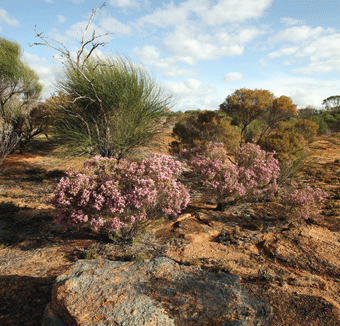
|
Published:
Outcrops ‘oases’ in a changing climate
A Western Australian scientist is investigating whether granite outcrops may act as a refuge for some plants by helping them survive in a warmer climate.

|
|
Granite outcrop at Charles Darwin Reserve, WA. Credit: Bush Heritage Australia
|
Curtin University of Technology’s Associate Professor Grant Wardell-Johnson says south-west Australia is particularly vulnerable to the effects of climate change. ‘As well as being one of the richest biodiversity hotspots in the world, it is also a very flat landscape surrounded by desert and ocean,’ he says. ‘This will make it very difficult for many plant and animal species to survive as the weather warms, for they will be unable to retreat to high mountains or towards the poles.’
His research has indicated there may be refuges where many plants will be able to survive. ‘Some of the places where many native plant species might persist include granite outcrop environments because they have many microhabitats and local climates,’ he says.
‘These small areas, with their own particular environment, include protected and sheltered gullies and crevices which may reduce the effects of weather extremes such as intense fires.’



